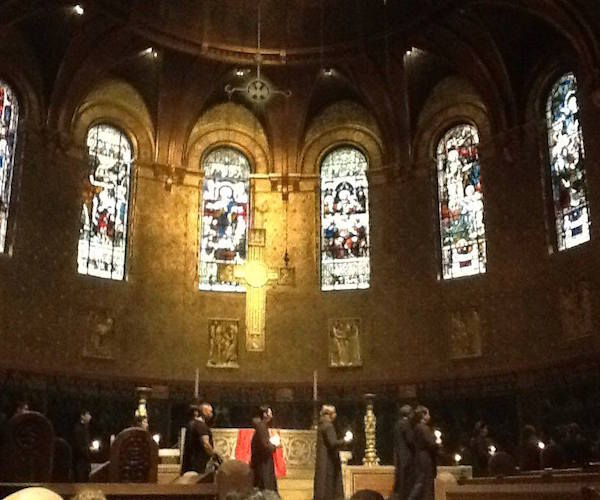Concert Review: After 700 Hundred Years, “The Play Of Daniel” Still Sings Truth To Power
The Boston Camerata’s lucid production placed emphasis on music and movement and a chiaroscuro-inspired use of light and shadow.

A scene from the Boston Camerata production of “The Book of Daniel” at the Trinity Church in Boston. Photo: Mark Hänser.
By Mark Hänser
“Beauvais 1300 and Boston 2017 are largely the same,” announced Boston Camerata director Anne Azéma at Boston’s Trinity Church on the afternoon of January 29, before an exquisite performance of the medieval mystery (or miracle) Play Of Daniel. At the same time, thousands were protesting the US government’s new immigration policies in Copley Square, right outside. The biblical Book Of Daniel, at least as interpreted by 13th century students and scholars in the French cathedral city of Beauvais, could have been talking directly to the crowd of dissenters; it’s timeless message speaks, or in this case sings, truth to power.
Performed in French and Latin, with an occasional passage in English, Ludus Danielis opens with a liturgical Prelude that includes passages of Gregorian chant. The choir walked in carrying candles as a sensor filled the air with incense. Jason McStoots made for a convincing Balshazzar, King of Babylon, strikingly costumed in a red fez and fatigue jacket pinned with medals. His court is merry and feasting, making use of stolen sacred Judean vessels for tableware. But after the ominous words MANE THECHEL PHARES appear on the wall — in this production, the surface is Trinity Church’s golden chancel — confusion ensues. The king calls for a translator, and his queen offers a suggestion — the Hebrew captive Daniel, played with ethereal grace by Jordan Weatherston Pitts. Clad in a green fatigue jacket, the prophet emerges from the audience, meeting Balshazzar amidst a glorious polyphony from the choir. Daniel translates the warning, telling the king that he has been blasphemous, urging him to accept the God of the Hebrews. Balshazzar converts, and rewards Daniel with a vestment of green and gold.
All this took place as the afternoon light began to dim. In the medieval period, it was understood that God could take the physical form of light — LUX — and the Boston Camerata’s brilliant manipulation of light in this production was as innovative as it was enthralling. Candle light, natural light, and incandescent light lend a spectral illumination to this medieval liturgical drama; technician Peter Torpey deserves considerable praise for this nuanced luminous setting.
As the light dimmed, the Persian king Darius, marvelously voiced by Joel Frederiksen, marched forth to slay Balshazzar and seize his kingdom and throne. This was accomplished by an elemental but effective gesture — he knocked the crown off Balshazzar’s head. Darius now asked for Daniel’s counsel; a chorus sang the prophet’s praises (as well as those of the Messiah to come). But evil courtiers, or satraps, conspire against Daniel, persuading the Persian king to declare that he himself is a god: Decreverent in tua curia. Daniel leaves the court to pray to his God, the God of the Hebrews. His seditious action is discovered by the satraps, and Darius mournfully sentences that Daniel be placed in the lions’ den. Ominous shadows frame this frightening scene. Darius tells Daniel that that his faith will save him — if his faith is true. Flickering house lights imitated candlelight.
The Boston Camerata’s lucid production placed emphasis on music and movement and a chiaroscuro-inspired use of light and shadow. The simplicity of the costuming and the splendor of Trinity Church were there to complement the score, not call attention to themselves. Unlike other versions, there were no “lions”; rather, the beasts were implied. Daniel is rescued — in dramatic fashion — by an angel from the predators. Here the celestial being shielded him with a red cloak — the same red as Balshazzar’s crown, a resonate bit of costume design. The avenging angel, soprano Camila Parias, did double duty in this production; she was also cast as Balshazzar’s queen. Darius, dazzled by Daniel’s godly favor, demands his satraps be tossed into the lion’s den. Darius then commands that Daniel’s God be worshipped by all. The prophet foresees the birth of the Messiah and the angel reappears, announcing the birth of Jesus in Bethlehem. The performance concluded with a Postlude, or choral coda, from medieval Beauvais.
There were a number of compelling virtues in this production. They included an effectively Salome-like dancer (Idrany Datta-Barua), complete with accompanying silver platter; the excellence of the musicians (Shira Kammen on vielle and harp, Karin Nagi on percussion and shakers, and Anne Azéma herself on a modified hurdy-gurdy); the resplendent strength of the group’s’s variety of voices, those of children and adults alike. And, of course, the sacred space hosting a theatrical staging. Medieval audiences, given their lack of literacy, would have been comfortable with dramatizations of biblical stories and lessons from liturgical readings.
People of the era were all too familiar with secular tumult as well. The sounds of the protesting crowd outside Trinity Church were ironic testaments to the timeliness of this timeless music: a beauty that establishes a visceral connection now and then. Indeed, when Daniel spoke as a witness to messianic prophesy, Azéma sang “Of people marching in Boston as in old Beauvais.”
Mark Hänser is a visual and performing artist, poet and writer, actor and musician, and educator. Mark has a BA in History from California State University Long Beach, where he majored in Medieval and Renaissance Studies; a BFA in Painting and Interrelated Media, with a minor in Art History, from Massachusetts College Of Art And Design; and an Ed.M in Arts In Education from Harvard University. He has written and edited for a number of publications, including the Boston Phoenix, where he wrote about music.
Mark has taught art in a number of Boston-area arts programs, and taught drama for a semester at the Cambridge Friends School. He really enjoys donuts.
